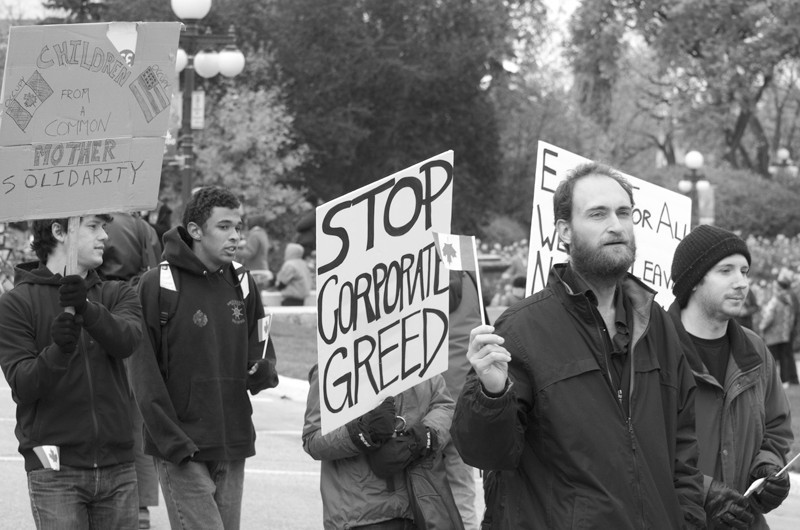I “liked” it on Facebook, what else do you want from me?
What does it take to get Canadians protesting in the streets?
The federal government is looking to cut costs and tighten the national belt.
Some people have even mentioned that dirty word, austerity.
It all brings to mind an image of the Athenian skyline, obscured by tear gas, smoke and thousands of raised fists.
But will Canadians take to the streets like so many others? Will riot police deploy to Winnipeg streets to battle the crowds? It doesn’t seem likely.
The Manitoba Legislature, probably the most active venue for public protest gatherings in Winnipeg, isn’t exactly booked solid.
When people gather to show their collective distaste for government policy, the numbers are pretty humble by Greek standards.
A gathering last September to protest the Federal crime bill C-10 drew around 300 people. The Canadian Federation of Student’s February 1 Day of Action rally against rising post-secondary tuition fees drew roughly 350 students and supporters.
These numbers are a far cry from the estimated 30,000 to 50,000 students involved in tuition rise protests in London in November 2010 or the 25,000 to 60,000 Russian demonstrators who gathered in Moscow in December to call for new parliamentary elections.
Perhaps Winnipeg is not the most ideal Canadian comparison.
G20 protests in Toronto in June 2010 drew an estimated 10,000 demonstrators. Police action during that weekend also went down as the largest mass arrest in Canadian history.
“In the case of the G20, I believe that the protests themselves were poorly planned and badly orchestrated, but this was primarily a result of the immense police brutality and crackdown on any dissent in the city in the days and months before,” says Chris Webb, a York University graduate student who participated in the G20 demonstrations.
Despite a less-than-perfect execution, Webb still says that protest is necessary.
“I think history teaches us very clearly that in order to create lasting and progressive change that benefits poor and working people, we need to voice our opposition relentlessly,” says Webb. “The alternative is simply too horrifying.”
“Sometimes marches and rallies don’t seem to make any difference, and petitions unravel as soon as we deliver them,” says Mary McCandless, chair of the Winnipeg chapter of the Council of Canadians, a citizens’ organization that promotes progressive policies on social and economic issues. “Until we get to look back years later when all those tiny threads form one big splash of world-changing colour.
“Other times - well, maybe the world didn’t change after all. And maybe that’s all right, because that seemingly insignificant action helped prepare the ground for the next generation.”
“Is protest necessary? Always,” says Webb. “Is it always effective? No.”
If protest is so necessary, why don’t Canadians do more of it? McCandless says it is a function of a cultural aversion to conflict rather than widespread apathy.
“As a nation, we are still likely to be more polite and less visibly passionate about almost anything,” McCandless says. “We are circumspect in our behaviour, anxious to avoid causing offence and eager to explain away conflict as a misunderstanding.”
Canadians seem to be fans of the slow and steady, letting things happen at a manageable pace without rocking the boat too much.
“In general, I think Canadian political culture is such that it places value in institutions and institutional change,” says Webb. “But I think this could change.”
Both Webb and McCandless note that the change may have already begun.
A combination of government scandals and increased access to information and discussion about these scandals are making more Canadians get involved.
“The crime bill, Bill C-30, the robocall scandal, the expensive and unnecessary F-35 fighter jets - Canadians are finding out about a lot of things thanks to the Internet, alternative news, citizen journalism and organizations like LeadNow,” says McCandless.
Until recently, media was a major impediment to Canadian protest action, says Trevor Semotok, another member of the Council of Canadians Winnipeg chapter.
“Canadians protest less as a function of poor mass media,” Semotok says. “Greece and the U.K. have a functional press for non-corporate news, whereas our media equates voter suppression with dirty tricks.”
But scandals aside, Webb says that when more fundamental aspects of Canadian society begin to be threatened, people might be forced to get involved.
“Canada has a fairly robust welfare state, but I think this is changing under Harper and I hope we see a groundswell of opposition to further cuts and austerity,” Webb says.
McCandless agrees.
Canadians might be too polite sometimes, but there are limits.
“Real protest will come slowly as we begin to accept that today’s Canada is significantly different from the one we would like to see,” she says.
“Today in Toronto I see a lot of immigrant communities organizing and getting politically involved,” Webb says. “Recently there has been a lot of organizing and protests against Rob Ford’s cuts, which has been heartening.”
Published in Volume 66, Number 23 of The Uniter (March 14, 2012)






